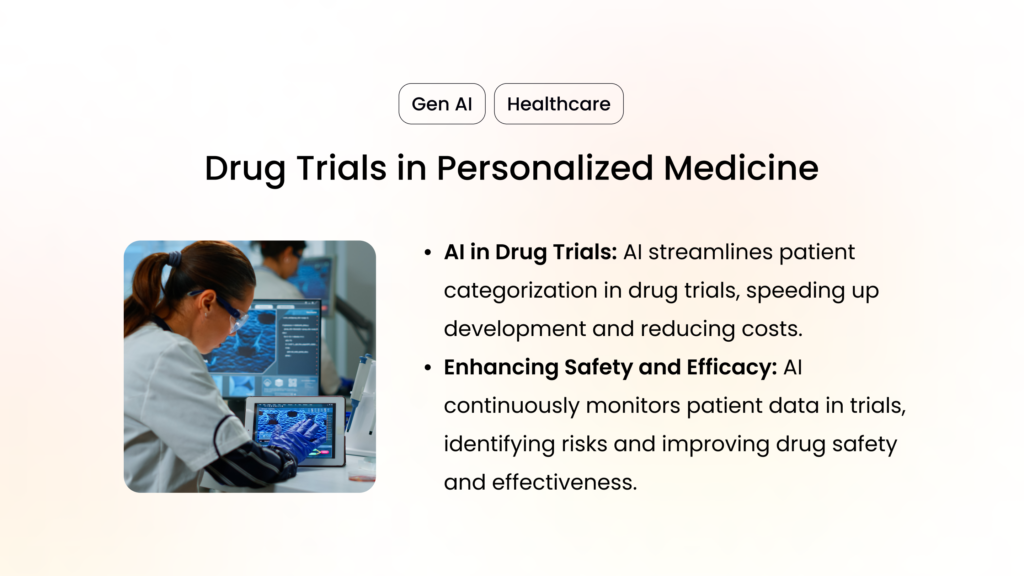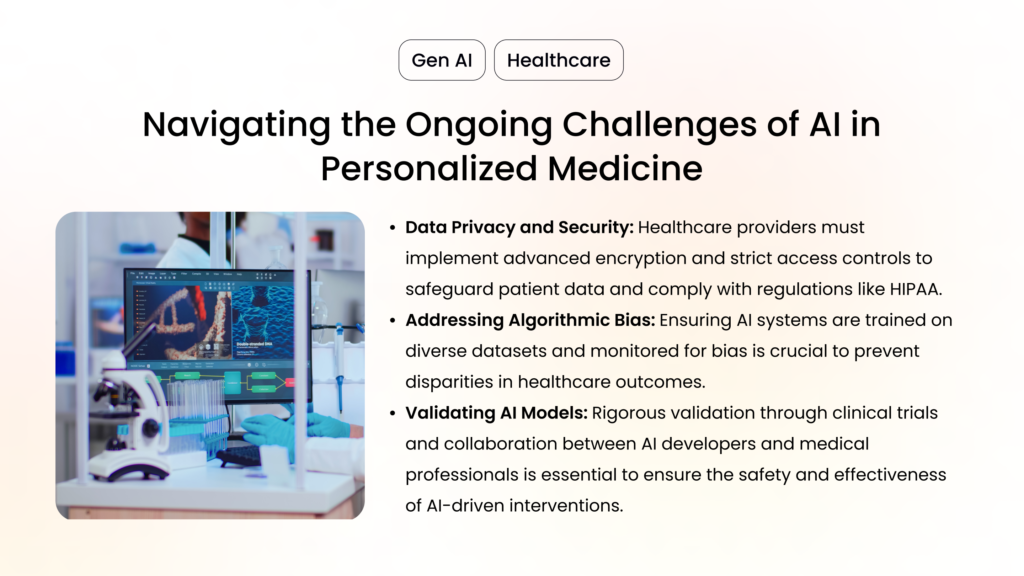In today’s fast-paced world, personalization strategies have been core of various industries, from marketing and retail to healthcare. One of the most promising advancements in this trend is personalized medicine, also known as precision medicine.
This innovative approach tailors medical treatments, predictions, and preventive strategies to an individual’s unique genetic, environmental, and lifestyle factors. With the advent of AI and machine learning, healthcare professionals can now overcome the challenges of personalized medicine more effectively, offering unprecedented levels of care and precision.
The Evolution of Personalized Medicine: From Traditional Approaches to AI Integration
Personalized medicine represents a paradigm shift in healthcare by acknowledging that a “one-size-fits-all” approach is often ineffective. Traditional medicine largely relied on standardized treatments, but personalized medicine leverages individual differences to enhance treatment efficacy.
Factors such as genetics, lifestyle, and environmental exposure are critical in determining how patients respond to treatments. By considering these variables, personalized medicine aims to improve patient outcomes and deliver truly patient-centered care.
The Role of AI in Personalized Medicine
The integration of artificial intelligence (AI) has revolutionized personalized medicine. AI algorithms can analyze vast amounts of patient data, uncover insights, and predict treatment responses with remarkable accuracy. This capability has accelerated research and treatment development, leading to discoveries of biomarkers and therapeutic targets that further refine interventions.
Moreover, AI-powered personalized medicine enhances preventive care. By identifying individuals at higher risk of diseases, AI enables early intervention, potentially mitigating the disease before it progresses. AI’s ability to adapt and learn from real-time patient data also ensures continual refinement of treatment plans, leading to better long-term outcomes.
Advantage of AI in Personalized Medicine
The vast amounts of data generated in healthcare present both a challenge and an opportunity. Traditional methods of data analysis are often insufficient for handling the volume and complexity of medical data. However, AI excels at analyzing big data, turning it into actionable insights.
How AI Utilizes Big Data
AI algorithms can scan through electronic health records (EHRs), genetic information, and even lifestyle data to identify patterns and correlations that might be missed by human analysts. By processing this data, AI can predict how patients will respond to specific treatments, allowing for more targeted and effective interventions.
For instance, AI can help in stratifying patients based on their genetic profiles, lifestyle choices, and other critical factors. This stratification enables healthcare providers to develop personalized treatment plans that are more likely to succeed.
Furthermore, AI can continually update these plans based on new data, ensuring that treatments remain effective over time.
Drug Trials in Personalized Medicine
Drug trials are a crucial component of personalized medicine, translating scientific discoveries into practical applications. These trials often involve categorizing patients based on genetic, molecular, and clinical factors—a process that AI can streamline significantly.

Accelerating Drug Development with AI
AI can quickly identify patient groups most likely to benefit from a new treatment, thus speeding up drug development. This acceleration not only reduces costs but also brings life-saving treatments to market more quickly. Without AI, drug development tends to be slower and more expensive, with an average cost of $2.6 billion per new drug.
By identifying responsive patient groups early in the trial phase, AI can save significant time and resources. This efficiency is particularly beneficial in developing treatments for rare diseases, where patient populations are small and traditional trials may take years to yield results.
Enhancing Safety and Efficacy
Safety is paramount in drug trials, and AI can help mitigate risks by continuously monitoring patient data. AI algorithms can detect adverse reactions and other safety concerns in real time, allowing for immediate adjustments to treatment protocols. This proactive approach enhances the safety and efficacy of new drugs, ultimately benefiting patients and healthcare providers alike.
Navigating the Ongoing Challenges of AI in Personalized Medicine
While AI offers numerous advantages in personalized medicine, it is not without challenges. Issues such as data privacy, algorithmic bias, and the need for robust validation of AI models must be addressed to fully realize AI’s potential in healthcare.

Data Privacy and Security
With the increasing reliance on big data, ensuring the privacy and security of patient information is critical. Healthcare providers must implement stringent data protection measures and comply with regulations such as HIPAA to safeguard patient data.
This includes using advanced encryption methods, secure data storage solutions, and stringent access controls to ensure that only authorized personnel can access sensitive patient information. Regular audits and updates to security protocols are also essential to prevent data breaches and unauthorized access.
Addressing Algorithmic Bias
AI algorithms are only as good as the data they are trained on. If the training data is biased, the AI’s predictions and recommendations may also be biased, leading to disparities in healthcare. It is essential to use diverse and representative datasets and continuously monitor AI systems for bias.
Moreover, involving multidisciplinary teams in the development and evaluation of AI models can help identify and mitigate potential biases. Researchers must also prioritize transparency in AI systems, clearly documenting the data sources and methodologies used to develop these algorithms.
Validating AI Models
The effectiveness of AI in personalized medicine depends on the accuracy and reliability of AI models. Rigorous validation processes, including clinical trials and peer reviews, are necessary to ensure that AI-driven interventions are safe and effective. This involves not only testing the algorithms on various datasets but also assessing their performance in real-world clinical settings.
Collaboration between AI developers, medical professionals, and regulatory bodies is crucial to establishing standards and guidelines for AI validation. Continuous monitoring and post-implementation evaluation can further ensure that AI models remain effective and adapt to new data over time.
By addressing these challenges, the healthcare industry can harness the full potential of AI, leading to more personalized, efficient, and equitable patient care.
The bottom line
AI has the potential to revolutionize personalized medicine, offering unprecedented levels of precision and care. By harnessing big data, accelerating drug development, and improving preventive care, AI can transform healthcare into a more patient-centered, efficient, and effective system. However, it is crucial to navigate the challenges of data privacy, algorithmic bias, and model validation to fully realize AI’s promise in personalized medicine.
As we continue to explore the capabilities of AI in healthcare, it’s clear that personalized medicine is not just the future—it’s the present. For those eager to stay at the forefront of this medical revolution, now is the time to embrace AI and its transformative power in personalized medicine.
Explore the potential of AI in personalized medicine with us. Sign up for our newsletter to stay updated on the latest advancements in AI and healthcare, and discover how you can leverage these innovations to improve patient outcomes and drive your medical practice forward.






